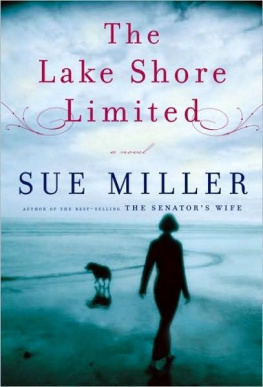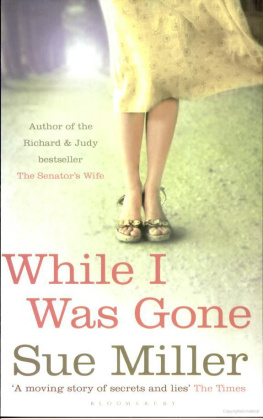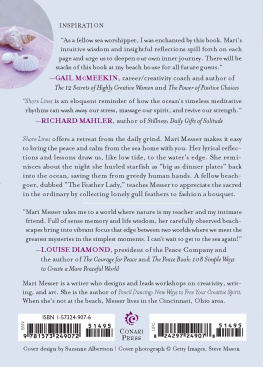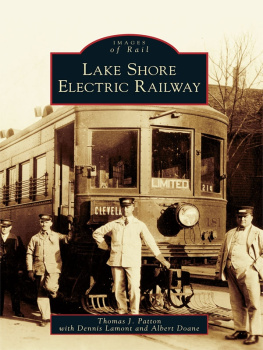Sue Miller - The Lake Shore Limited
Here you can read online Sue Miller - The Lake Shore Limited full text of the book (entire story) in english for free. Download pdf and epub, get meaning, cover and reviews about this ebook. year: 2010, publisher: Knopf, genre: Science fiction. Description of the work, (preface) as well as reviews are available. Best literature library LitArk.com created for fans of good reading and offers a wide selection of genres:
Romance novel
Science fiction
Adventure
Detective
Science
History
Home and family
Prose
Art
Politics
Computer
Non-fiction
Religion
Business
Children
Humor
Choose a favorite category and find really read worthwhile books. Enjoy immersion in the world of imagination, feel the emotions of the characters or learn something new for yourself, make an fascinating discovery.
- Book:The Lake Shore Limited
- Author:
- Publisher:Knopf
- Genre:
- Year:2010
- Rating:4 / 5
- Favourites:Add to favourites
- Your mark:
- 80
- 1
- 2
- 3
- 4
- 5
The Lake Shore Limited: summary, description and annotation
We offer to read an annotation, description, summary or preface (depends on what the author of the book "The Lake Shore Limited" wrote himself). If you haven't found the necessary information about the book — write in the comments, we will try to find it.
The Lake Shore Limited — read online for free the complete book (whole text) full work
Below is the text of the book, divided by pages. System saving the place of the last page read, allows you to conveniently read the book "The Lake Shore Limited" online for free, without having to search again every time where you left off. Put a bookmark, and you can go to the page where you finished reading at any time.
Font size:
Interval:
Bookmark:
Lost in the Forest
The Story of My Father
The World Below
While I Was Gone
The Distinguished Guest
For Love
Family Pictures
Inventing the Abbotts
The Good Mother

FOR ZOE

BECAUSE IT WAS STILL AFTERNOON, because she was in a strange room, because she was napping rather than sleeping ("I'll just lie down for a bit and see what happens," she'd told Pierce)--because of all this, she was aware of herself as she dreamed, at some level conscious of working to subvert the dream she was having, to make it come out another way, different from the way it seemed to be headed.
She was trying to get to Gus, that was the idea. Somehow she knew that he was far away and by himself, that he was in trouble. It was one of those dreams of turning wrong corners, of ending up in nightmare neighborhoods or in twisting empty corridors, of searching in vain. A dream of haste, too. Yes, now she understood that she was late, terribly late. She was trying to run, but her legs were thick and heavy, hard to move.
Oh, this is classic , she thought, floating over the whole mess. This is so predictable .
Let's not , she thought.
And it worked. For here was Gus, suddenly, conjured by her, shoved into the dream where he wasn't yet supposed to be--she still had miles to go. He looked younger than he'd been when last she'd seen him in life. He was smiling fondly at her.
"I'm sorry to be late," she said. This came out oddly because, she realized abruptly, she was weeping.
"Oh, you're always late," he said, carelessly, affectionately; and she woke up.
It simply wasn't true, what he'd said--she was never late--and this accusation, even so lightly made, this was the part of the dream that left her most disconcerted. She lay in the wide bed, the sensation of weeping still with her--in her throat, her chest--and looked around the room. The hotel room.
They were in Boston, in an expensive hotel overlooking the Public Garden. She had booked it. She had even specified the floor--high up enough to be looking across into the trees. It must have been four-thirty or later, she thought. It was dusky outside and the room was deep in shadows. She could hear voices in the hall, the women who turned down the beds, most likely. They were lingering, chatting out there. It was a language she couldn't understand, full of guttural sounds. Portuguese maybe. A jewel-bright stripe of light glowed at the bottom of the door. One of them laughed.
She was alone in the room. Pierce had gone to the Museum of Fine Arts, to a show she had read about in the paper and suggested to him--she wanted him to have something to do in the city that he enjoyed, too. It was a show of Japanese prints called the Floating World, prints of the life of the theater and the world of courtesans from the eighteenth and nineteenth centuries. Apparently it included some never-before-displayed erotica, described as fantastic in its inventiveness. It was on account of this that she'd recommended it to Pierce. Just his cup of tea, she'd said to him.
"You're sure you don't want to go?" he'd asked as he was about to leave. "You're not drawn by the prospect of those immense members being waved about?" He swung his arm wide. "Poked here and there?"
"I get my fill of immense members at home. I don't need to go to the MFA for that."
He had smiled, surprised at her, and then taken a formal bow before he exited, wearing his old tweed overcoat. She had told him recently that he looked like a panhandler in it--and he did, even when he was wearing the fancy leather gloves she'd given him for his birthday, as he had been today.
He didn't care, he'd said. "And we could always use the dough."
He would be back soon, she supposed. She should get up and try to make herself look more presentable.
But she didn't right away. She lay with her eyes closed, thinking of the version of Gus she had invented in the dream. Why do we alter them in the way we do? Why make him so young, so happy?
Erasing it, she supposed. The way he'd died. The awfulness of it. Its solitariness, as she thought of it, though he'd hardly been alone.
Gus was her brother, younger by fourteen years. He would have been forty-five now if he'd lived. He'd died six years earlier. For the most part she'd stopped thinking, or even dreaming, about the moment of his death, the exact way it happened, which she was grateful for. But she still dreamed of him, and she was grateful for this, too. In this afternoon's dream he seemed to have been in his early twenties--handsome, smiling, teasing her. That was his age at the point in their lives when they'd been closest. Before then she hadn't paid much attention to him, he was so much younger--four years old when she went off to college, eleven when she married.
But a few years after that, when Gus was still in high school and she and Pierce were first living in New Hampshire, their parents divorced and things changed. Their father moved to California and disappeared, though for a few years he still called her occasionally late at night--midevening his time--loaded, weepy, full of useless and temporarily felt love. The first few times he did this she had stayed on the phone with him as long as he wanted to talk. She had imagined finding some way back to the affection that had existed between them when she was a girl.
But nothing happened as a result of the calls, nothing changed. They began and ended the same way each time, as if he had no memory of the one before. And probably he didn't. Probably he had some vague notion when he woke the next day that he'd talked to someone he knew. Maybe he even remembered it was Leslie. But he clearly remembered nothing specific--not the promises to visit, not the pleas for forgiveness. In the end she started turning off the phone when she and Pierce went to bed.
Their mother moved into a one-bedroom apartment after the divorce, and Gus slept on a daybed in the living room. When he went away to college, she gave the bed to the Salvation Army and bought a real couch--she was tired of not having what she called "a decent place to entertain"--and that became Gus's bed when he was home. She was dating by then, and often didn't come back to the apartment at night at all, so Gus would wake alone in the morning, fix his own breakfast, and start calling his old high school friends for company.
Pretty quickly he stopped going home on school vacations and began to come instead to stay with her, to stay in the house just across the river into Vermont that she and Pierce had bought a few years after he got the job at Dartmouth-Hitchcock. They gave a room over to him, and he slowly began to accumulate stuff in it--books, sports equipment, records and tapes and posters. After college, he'd gone to work in Boston, but he still came home regularly--home to Pierce and Leslie's house.
It was over these years that Leslie came to know him, to love him as a person, not just as the cute little brother. She understood that some of this had to do with her inability to get pregnant, for those were also the years when she and Pierce were trying, and failing, to have children. She was, she supposed, depressed most of that time. At any rate, she felt she was learning how deeply life can disappoint you, how all that's good can become bad--for she and Pierce had turned away from each other then, and why not? when the most joyous, intimate connection between them had become enforced, more or less a topic for public discussion with doctors, with nurses--a matter simply of successful or unsuccessful function.
Font size:
Interval:
Bookmark:
Similar books «The Lake Shore Limited»
Look at similar books to The Lake Shore Limited. We have selected literature similar in name and meaning in the hope of providing readers with more options to find new, interesting, not yet read works.
Discussion, reviews of the book The Lake Shore Limited and just readers' own opinions. Leave your comments, write what you think about the work, its meaning or the main characters. Specify what exactly you liked and what you didn't like, and why you think so.














